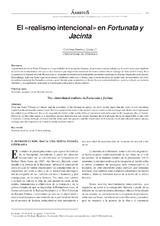El "realismo intencional" en Fortunata y Jacinta
Autor
Jiménez Gómez, Cristina
Editor
Asociación de Estudios de Ciencias Sociales y HumanidadesFecha
2014Materia
RealismoReceptor
Epojé
Ficción
Lectura
Realism
Receiver
Fiction
Reading
METS:
Mostrar el registro METSPREMIS:
Mostrar el registro PREMISMetadatos
Mostrar el registro completo del ítemResumen
A partir de la teoría de Darío Villanueva y los postulados de la recepción alemana, demostramos en este trabajo que lo «real» no es algo implícito en la novela decimonónica, sino que es un constructo que surge en la conciencia del lector cuando éste se sumerge de lleno en la ficción y lleva a la práctica la llamada epojé de Husserl, esto es, suspende la creencia en la realidad de su entorno y participa en el juego imaginario de la ficción. Sin embargo, todo esto tiene lugar en un proceso dialéctico entre texto y lector, pues el texto presenta los hechos más inverosímiles con visos de realidad mediante los llamados realemas que el literato pone en práctica y el lector lleva su contexto histórico, social y cultural, sus lecturas literarias y su experiencia vital hasta la ficción para configurar el objeto estético. From the Dario Villanueva´s theory and the postulates of the German reception, we show en this paper that the «real» is not something implicit in the nineteenth-century novel, but is a construct that arises in the reader’s consciousness when it plunges into fiction and implements the called epojé of Husserl, this is, he suspends the belief in the reality of his environment and participates in the imaginary play of fiction. However, all this takes place in a dialectical process between text and reader, because the text presents the most improbable events with overtones of reality through realemas that the writer puts into practice and the reader takes its historical, social and cultural context, literary readings and life experience to fiction to set the aesthetic object

